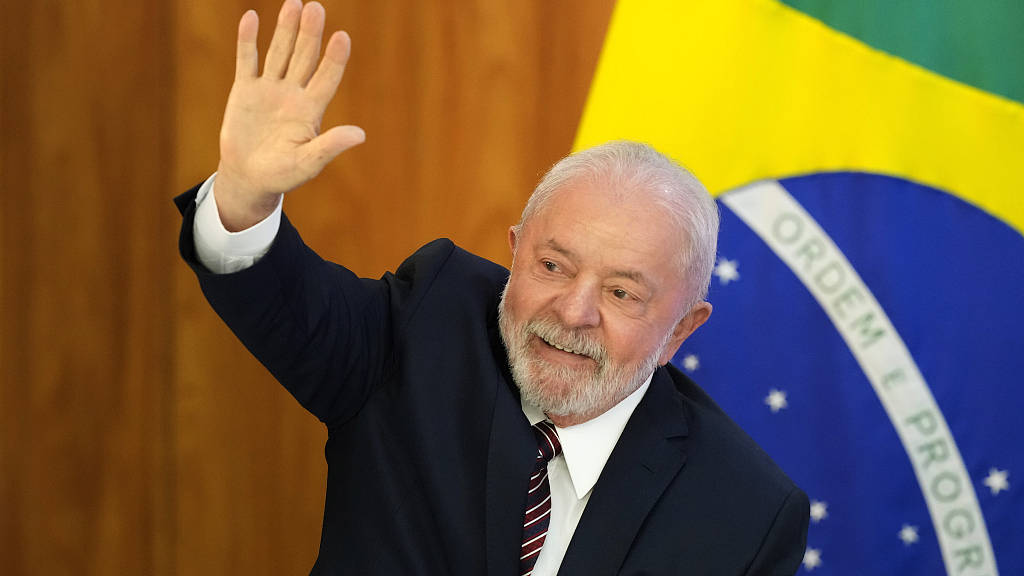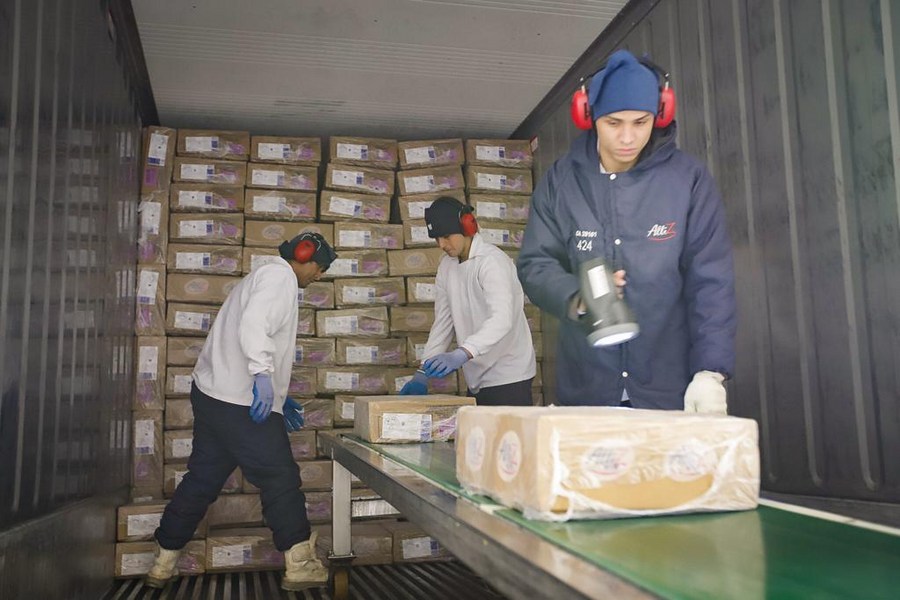
Brazilian President Luiz Inacio Lula da Silva waves as he arrives for a meeting at Planalto Palace in Brasilia, Brazil, April 10, 2023. /CFP
Brazilian President Luiz Inacio Lula da Silva waves as he arrives for a meeting at Planalto Palace in Brasilia, Brazil, April 10, 2023. /CFP
Editor's note: Iara Vidal is a Brazilian journalist, who writes for the column China em Foco at Revista Forum. The article reflects the author's opinions, and not necessarily the views of CGTN.
Brazilian President Luiz Inacio Lula da Silva will arrive in China on March 12 for one of the most important state visits at the beginning of his third term. The Brazilian entourage is made up of five governors, eight senators, and 19 federal deputies and businessmen. Of the 40 parliamentarians invited by the Planalto Palace, 26 confirmed their presence.
The Brazilian government's objective is to deepen relations with the country's main trading partner since 2009. In 2022, China imported more than $89.7 billion in Brazilian products, especially soybeans, and ores, and exported almost $60.7 billion for the domestic market. The traded volume, $150.4 billion, grew 21 times since Lula's first visit to the country in 2004.
Even with the postponement of President Lula's visit to the Asian country at the end of March due to health issues, part of the delegation that had traveled to China achieved important results, especially in agriculture and livestock, such as the end of the embargo on the sale of beef from Brazil to the country, obtained in record time, only four weeks of suspension.
The Minister of Agriculture and Livestock, Carlos Favaro, who had traveled to Beijing before the presidential delegation, fulfilled part of the initially scheduled agenda and brought the results to President Lula in a meeting on April 4. According to him, the Chinese authorities were receptive in all the meetings, and the visit of the presidential delegation to the country could facilitate the signing of new agreements.
What're on the agenda?
"Important negotiations that we dreamed of many years ago should come true with President Lula's presence in China," highlighted the minister after the meeting. One of them is digital certification, which should make the processing of products faster and more reliable, reducing bureaucracy for Brazilian exporters. The agreement that provides for direct operation between the Brazilian real and the Chinese yuan, without the need for dollarization, should also facilitate trade between the two countries.
Other prominent areas on the agenda for the event include tourism and investments. The Brazilian programs for combating hunger, protecting the environment, and sustainable development may once again be seen as a reference by the Chinese government.
About 20 bilateral agreements are expected to be signed during the visit. One of them will be for the construction of the Earth Resources Satellite-6 (CBERS-6), the sixth of a line of satellites built in partnership between Brazil and China. The advantage of the new model is a technology that allows the monitoring of biomes such as the Amazon Forest even with clouds.
Brazil under Lula: Trade partners with China
The year 2023 is the 50th anniversary of the beginning of trade relations between Brazil and China. The first sale between the two countries took place in 1973, a year before the establishment of Sino-Brazilian diplomatic relations.

Staff of a Brazilian food company pack chicken meat which will be sent to China at the Port of Santos in Brazil, January 14, 2020. /Xinhua
Staff of a Brazilian food company pack chicken meat which will be sent to China at the Port of Santos in Brazil, January 14, 2020. /Xinhua
In 2022, the best-selling Brazilian product in the Chinese market was soy. It accounted for 36 percent of total exports, followed by iron ore at 20 percent and oil at 18 percent. The export profile changed slightly in January and February 2023, with oil in the lead at 23 percent, followed by soybeans at 22 percent and iron ore at 21 percent.
Trade with China was leveraged in President Lula's first two terms as the exports to the Chinese market surged from just $4.5 billion in 2003, his first year in office, to $30.7 billion in 2010, his last year during the second term. Similarly, the imports from China totaled only $2.1 billion in 2003 but it witnessed a rapid growth of 1,100 percent to $56 in 2010.
Relaunch of bilateral relations
Lula's visit this week is part of the reconstruction of the new Brazilian government's international relations, which includes the trips already made to Argentina, where the Community of Latin American and Caribbean States meeting also took place, to Uruguay and the United States, in addition to meetings with European leaders. It will also be the first visit outside the Western Hemisphere.
This will be the third official visit of the Brazilian president to China. The relationship between the two countries has tightened – and the trade balance has grown continuously and sustained – since President Lula's first visit to Beijing in 2004. The president's second visit to China was in 2009.
(If you want to contribute and have specific expertise, please contact us at opinions@cgtn.com. Follow @thouse_opinions on Twitter to discover the latest commentaries in the CGTN Opinion Section.)